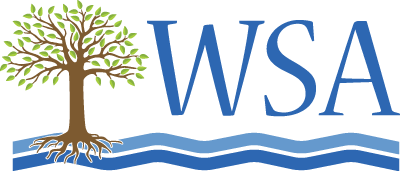Waste Management
This page is for Master Watershed Stewards considering a Behavior Change campaign in their communities. To learn more about what you can do as an individual click here.
Making the right choice when managing your household waste is an important way to help protect the environment and The Chesapeake Bay. An obvious effect of properly disposing of your waste, is the reduction of litter that washes into our waterways. Another important impact of reducing your waste or disposing of it in the most efficient manner is the reduction in water use, energy use, and pollution caused by the production of new materials. Reducing, reusing, and recycling your waste help to cut down on air pollution which in turn becomes water pollution when rainfall catches air pollutants and washes them into streams.
(Note: Some of the behaviors below are general and should be made more specific before designing a Behavior Change campaign.)
Behavior: Recycle all recyclable items.
It is easy to recycle! If you must dispose of materials, recycling is a great option. Much of your household waste is recyclable and will be picked up curbside. Anne Arundel County now uses single-stream recycling, so you don’t even have to separate your recyclables. If you are unsure about what is recyclable or when your recycling pick-up date is, you can find out here: http://www.recyclemoreoften.com/
Some of the common perceived or actual barriers to people recycling all recyclable items include:
Some of the common perceived or actual benefits for people recycling all recyclable items include:
1. Extending the supply of natural resources
2. Litter reduction
3. Improvement of environmental quality
4. Preservation of landfill space
5. Energy conservation
6. Resolution of a national problem
7. Cleaner streets
8. Peace of mind
9. Feeling that they are “doing their part”
10. Community pride
11. Teaching children good habits
12. Making a cleaner environment for present and future generations
13. To impress neighbors/ social pressure
14. Financial motives
15. Habit
Behavior: Reduce waste by using less.
The amount of waste disposed of and recycled can be reduced by using less to begin with and reusing instead of disposing of materials. This could be accomplished by composting food wastes, reusing plastic grocery bags and purchasing items with less packaging, just to name a few. Recycling takes a lot of energy and resources and often materials cannot be 100% recovered in the process. You can save energy and resources by reducing and reusing, versus recycling.
Some of the common perceived or actual barriers to people to create less waste include:
Some of the most common perceived or actual benefits for people to create less waste include:
1. Personal values
2. Personal responsibility
3. Self-efficacy
4. Social norms
5. Habit
6. Saves money
7. Convenient
8. Reduces clutter
Behavior: Properly dispose of all hazardous waste.
Some household products can contain dangerous materials that can be toxic, corrosive or highly flammable. Disposing of these items in the trash, sewage systems or outdoors can cause harmful substances to leach out and pollute the air, land and water. This can pose a threat to human health and the environment. Household Hazardous Waste treatment facilities handle these materials in safe manner. They work to treat these wastes so that they are no longer harmful. For more information visit:
http://www.epa.gov/epawaste/conserve/materials/hhw.htm or
https://www.aacounty.org/services-and-programs/household-hazardous-waste-drop-off-days
Some of the common perceived or actual barriers to people properly disposing of all hazardous waste include:
Some of the common perceived or actual benefits for people to properly dispose of all hazardous waste include:
1. Reduction and recycling of household hazardous waste conserves resources and energy that would be expended in the production of more products
2. Reuse of hazardous household products can save money and reduce the need for generating hazardous substances
3. Proper disposal prevents pollution that could endanger human health and the environment
Behavior: Avoid the purchase of household hazardous materials.
The best way to avoid the harmful or dangerous substances in household hazardous waste from entering the environment is to avoid using them. This eliminates the costs associated with treatment and decreases the chances of them ending up in landfills. Avoidance of the purchase and use of these materials can be accomplished by buying or making substitutes, using less of them and using up what you have and sharing with a friend. For more information: https://www.aacounty.org/services-and-programs/household-hazardous-waste-drop-off-days
Some of the common perceived or actual barriers for people to avoid the purchase of household hazardous wastes include:
Some of the common perceived or actual benefits for people to avoid the purchase of household hazardous wastes include:
1. Don’t have to take it somewhere special to dispose of it
2. Safer for your family
3. Safer for the environment
4. Cheaper to make your own products
5. Saves the County money to dispose of them
See what others have done!
Tools:
Search for specific products, what hazards they may have, and how to properly dispose of them
Anne Arundel County Household Hazardous Waste Brochure





